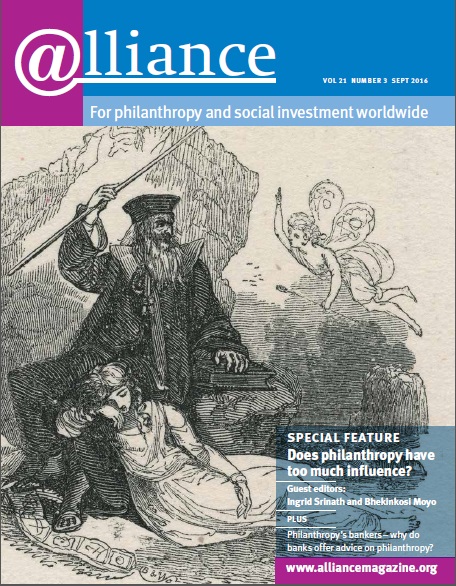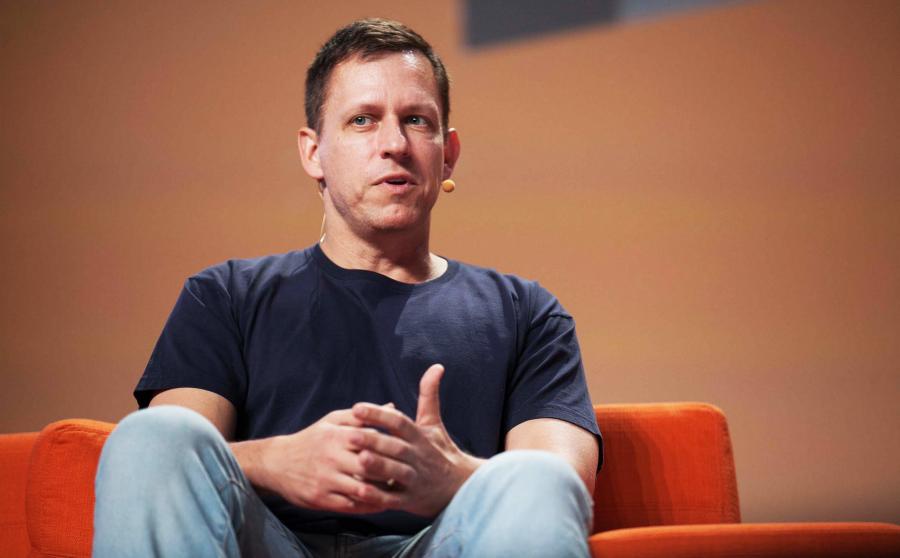In May, the worldwide media gleefully reported an unexpected twist in a story that had scooped headlines for months. The story emerged in the weeks after Terry Bollea, otherwise known as Hulk Hogan, had been awarded a major cash settlement in a lawsuit against Gawker, an online news tabloid. The jurors in the case were unaware that Bollea’s lawsuit had been secretly funded by Peter Thiel, a Silicon Valley investor. It turned out that Thiel had nursed a decade-long grudge against Gawker and had actively canvassed for legal cases to support as a third-party funder in order to force the newspaper to close. Thiel later professed to the New York Times that he considered his secretive legal battle to be ‘one of the greater philanthropic things that I’ve done’.
Many commentators were outraged. In Salon Scott Timberg suggested that Thiel’s appropriation of the word ‘philanthropic’ to describe his actions was ‘the strangest use ever’ of the term. Scores of news articles used scare quotes around the word ‘philanthropic’ in order to emphasize their own scepticism over the appropriateness of the term.
Silicon Valley’s appropriation and debasing of philanthropy
The problem with much of this commentary is that it presumed Thiel was an outlier among wealthy philanthropists, that he was single-handedly responsible for debasing the meaning of philanthropy, that he was somehow unique for having the gall to suggest that his self-serving actions were obviously useful for all humankind.
He is not. Far from being an outlier, Thiel is something of a poster-child for the new philanthrocapitalism. He’s at the forefront of a fast-growing trend: the tendency to subsume all sorts of lobbying, legislative and commercial activity under the umbrella of philanthropy.
‘Thiel is something of a poster-child for the new philanthrocapitalism. He’s at the forefront of a fast-growing trend: the tendency to subsume all sorts of lobbying, legislative and commercial activity under the umbrella of philanthropy.’
Timberg, a reporter for Salon, is one of the few observers to realize this, pointing out that, if ‘we look at what philanthropy means to today’s Silicon Valley’, then Thiel’s use of the term ‘may make sense as a dead-sincere statement’.
Timberg is right to point out that Silicon Valley tech moguls are spearheading a new philanthropic paradigm which assumes that all ‘wealth creation’ is naturally beneficial for humankind. This rhetoric is visible in countless examples, including Google CEO Larry Page’s proclamation that he’d rather gift his fortune to Elon Musk’s SpaceX than a traditional charity because Musk’s space exploration would do more for humanity.
What is wrong is to assume that such rhetoric is limited to Silicon Valley.
The tradition of philanthrocapitalism – where private profit = public good
In reality, the assumption that private enterprise inevitably contributes to humankind is rooted in 18th-century political economics – made fashionable by thinkers such as Bernard Mandeville and Adam Smith, who each praised the capacity of private profit-seeking to improve living standards. Mandeville and Smith also hailed the need for government regulation to ensure that private rewards are distributed in a just manner, an important caveat that today’s philanthrocapitalists often ignore even as they appeal to scholars in the classical liberal tradition (from Mandeville and Smith to thinkers such as Friedrich Hayek) to justify their own economic standpoint.
Take Peter Thiel. He is revered by many conservatives for his condemnation of government regulation and his defence of free enterprise; in 2015, he received a Hayek Lifetime Achievement award. Whether Hayek would have agreed with the award is debatable.
What would classical liberals such as Hayek make of today’s philanthrocapitalists – those who append the word ‘social’ to an endless list of activity (social innovation, social enterprise, social impact bonds) as if that terminological canonization inevitably made their business pursuits more socially responsible?
I suspect Hayek would not have shared in their aura of self-satisfaction. He was constantly on guard against lazy language. In one of his last works, The Fatal Conceit, he devoted a chapter on ‘our poisoned language’ to an attack on the excessive use of the word ‘social’ in popular discourse. He listed 160 nouns to which the word was routinely prefixed, from ‘accounting’ to ‘duty’ to ‘pension’ to ‘ethics,’ suggesting that ‘social’ was one of the great ‘weasel words’ of all time.
If ‘social’ was the great weasel word of the 20th century, then ‘philanthropy’ is at peril of suffering a similar fate today.
Weasel words, flexible definitions and words that are not for sale
Philanthropy is a word employed so wantonly by individuals and institutions pursuing overlapping and often antithetical goals that it risks losing its distinctiveness, its ability to mark out a realm of human affairs that is separate from both commerce and government – and therefore its power to hold either to account.
This is one of the significant problems facing large-scale philanthropy today: the fact that philanthropy’s terminological vapidity has weakened the non-profit sector overall by diluting its legal and moral specificity. Philanthropy’s semantic elasticity has made the sector something of an easy target, at risk of wholesale appropriation by investors and venture capitalists who claim that a philanthropic gift should be judged by its capacity to generate private revenue – often without sufficient regard to who gets to share in the spoils.
Hayek’s work led his followers to suggest that the societal effects of many state-planned efforts to improve human welfare were so pernicious that a word like ‘social’ really means ‘anti-social’ in practice.
The same can be said of much philanthropic activity today. By offering non-repayable gifts to large, well-endowed corporations; by warehousing wealth in donor-advised funds without payout rules; by shuffling money from one private account to another through the establishment of a new limited liability company and then labelling this burst of personal financial planning ‘philanthropy’ – the field is morphing into something antithetical to the way in which the public and legislators commonly perceive it.
The philanthropy of many of today’s tech billionaires is a sort of anti-philanthropy: a playground of private whims and secretive legal gambits where both vengeful and well-meaning donors are determined to make the world accede to their definition of the common good – whether that means bankrupting an online newspaper or commanding disproportionate media attention to stunts like Bill Gates’s recent chicken donation.
‘The problem with philanthropy is not that it is too powerful, but that certain voices within the sector are too powerful within it. Silicon Valley philanthrocapitalists are treating the non-profit sector in much the same way that they approach business rivals: as a realm to be dominated and subdued – and exploited for monetary gain.’
The problem with philanthropy is not that it is too powerful, but that certain voices within the sector are too powerful within it. Silicon Valley philanthrocapitalists are treating the non-profit sector in much the same way that they approach business rivals: as a realm to be dominated and subdued – and exploited for monetary gain.
Thiel is an outspoken monopolist. In his book Zero to One, he praises monopoly power as a conduit to entrepreneurial success. It is an insight that parallels John D Rockefeller’s earlier defence of both cartels and monopolies – something that Rockefeller knew was antithetical to Adam Smith’s criticism of trade associations. Rockefeller tried to develop an anti-Smithian theoretical defence of ‘cooperation’ to justify his use of government licences to trample on competitors. When cartels become agents of ‘cooperation’, it’s clear that language has never been and will never be entirely safe from creative appropriations – which is, paradoxically, a source of value that transcends the limits of markets.
The major philanthropists of the 19th century and today may be outspoken monopolists – but they will never have a monopoly on language. This is philanthropy’s strength. The word can be bullied into as many contorted shapes as the new ‘social’ warriors want. But it cannot be bought.
It was never for sale in the first place.
Linsey McGoey is a senior lecturer in sociology at the University of Essex.
Email lmcgoey@essex.ac.uk
Lead photo: Terry Bollea, aka Hulk Hogan, in court.








Comments (0)